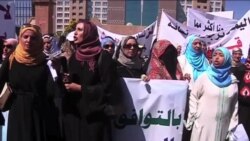A U. N. special envoy says Yemen’s political parties are close to signing a deal that could prevent the country from sliding into civil conflict. The crisis erupted last year when the Shia Houthi militia seized power, prompting the president to resign. There are fears that a descent into civil war could draw in rival powers Iran and Saudi Arabia.
Dozens of Yemeni women protested outside the hotel hosting the talks in the capital, Sana'a, this week, calling for an end to the political crisis. Sana'a resident Ibithal al-Deli was among them.
She said the political parties must come up with urgent outcomes to ensure Yemen does not plunge into war.
There are renewed hopes a civil war may be averted. In a statement Friday, United Nations’ Special Envoy to Yemen Jamal Benomar -- who is brokering talks between rival parties -- said a breakthrough agreement would see a transitional council replace the upper house of lawmakers.
The existing lower house, dominated by lawmakers supportive of the Houthis, would remain in place. A“people’s transitional council” would be created as an upper legislative chamber. That council would comprised of Houthis as well as other groups underrepresented in the traditional Parliament, including young people, women and people from southern Yemen.
“The distribution would give 50 percent to members from the northern governorates and 50 percent to the Southern provinces with a 30 percent quota for women and 20 percent for youth representatives,” said Mohammed Al Basha, a spokesman at the Yemeni Embassy in Washington.
Civil war still threatens
The September Houthi takeover of the capital -- a Shia militia from the north -- pitted them against Yemen’s Sunni tribes and other groups from the south.
Al Basha is cautiously optimistic about the new tentative agreement, but said there are still important issues to tackle like the composition of the presidential council, cabinet formation and the timeline for implementation.
“The situation is still fluid but we hope the agreement is the first step toward reconciliation which is a vital component to a sustainable peace in Yemen,” he said. “But the difficult part in the upcoming negotiations will be the guarantees for implementation.”
The country is still perilously close to civil war, according to Abubakr Al-Shemahi, a British-Yemeni journalist.
“There’s a lot of clichés around Yemen that it’s always on the brink. Negotiations always manage to save the day at the last minute. The problem with the Houthis is that in the negotiations in the past, they have simply gone back on their promises and advanced and advanced.”
The Houthis’ advance into the capital was helped by tacit support from the former president, Ali Abdullah Saleh. The United States accuses Saleh of supporting the Houthis to create the conditions for a coup.
“Saleh has been known over the past 40 years to play this game, to pit one side against the other," said al-Shemahi. "And I think he’s betting on being able to so that again. The question is, will he be able to do it with the Houthis as new actors, new people that perhaps may be able to have the upper hand over him.”
Regional powers
There are fears that any conflict would draw in regional powers, said Jane Kinninmont of policy institute Chatham House.
“The Houthis do have some support from Iran. Many people think that that is what has enabled them to be so well organized compared to a lot of other Yemeni political groups. And, of course, Saudi Arabia is very worried because of that regional dimension. So these factors up the stakes,” she said.
Saudi Arabia sent troops into Yemen in 2009 to counter a Houthi uprising. More than 100 Saudi soldiers were killed, and Riyadh is unlikely to risk another incursion, said Kinninmont.
“Another option is to arm the tribes. But Saudi Arabia will also be worried about the risks that support could inadvertently fuel al-Qaida in the Arabian Peninsula,” she said.
Sunni al-Qaida militants have clashed with Yemeni government troops and Houthi rebels. They could gain from the increasingly sectarian nature of the conflict, said al-Shemahi.
“The Houthis presenting themselves as this quite pro-Iranian movement have given the opportunity for al-Qaida to say, ‘look, Shias are in charge now, the pro-Iranian Shias, they must be defeated,'” said al-Shemahi.
The potentially explosive mix of tribal, regional and sectarian rivalries has pushed Yemen close to the brink of civil war. But the U.N. envoy insists the agreement on a transitional council does pave the way for a long-term peace deal.
Diplomat: Support new government
The U.S. cooperated closely with resigned Yemeni President Abd Rubbo Hadi’s government on operations against al Qaeda in the Arabian Peninsula for years.
Former U.S. Ambassador to Yemen Barbara Bodine, said the U.S. should now put its full support behind the brokered political agreement in Yemen. The veteran diplomat recommends that the U.S. take steps to prepare for what follows in Yemen.
“The U.S. and the international community should help Yemen with its economic development, to create more jobs and in moving the transition to a viable legitimate structure,” Bodin said.
Mohamed Elshinnawi contributed to this report from Washington.














